Lisbon is fast becoming one of Europe’s hottest destinations for digital nomads and remote workers. I’ve been living in — and working online from — Lisbon since 2016, so I can give you the insider scoop on where to stay and where to work from.
It’s no coincidence that many people choose to work remotely from Lisbon as has one of the nicest climates in Europe, with mild winters and a good nine months or so of sunny weather in the year. But there are so many more reasons why the city is getting so much attention as a remote work location.
You can expect a very friendly atmosphere, delicious food and wine, reasonable costs, lots of things to do in Lisbon and throughout Portugal, and every ingredient needed for a wonderful lifestyle.
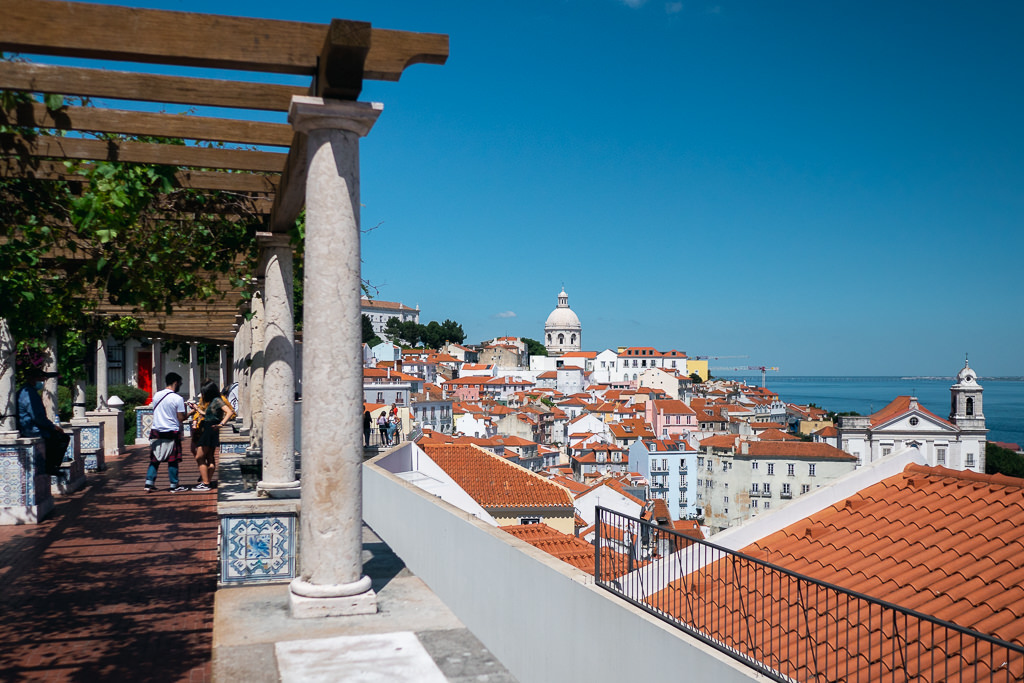
Moreover, Lisbon has an amazing international community that can help you make friends and find your feet in a new city quickly.
Lisbon is a common stop for digital nomads who hop around the globe to a new location every few months. The city also seems to inspire many to return year after year, or to make it their home base.
Lisbon for nomads – pros and cons
Pros:
- Large nomad community
- Outdoor lifestyle (surf, beach, hiking, etc.)
- Lots of co-working spaces
- Great climate
- Easily get by using English
- Low day-to-day costs
Cons:
- Relatively high rental costs
- Old houses get super cold in winter
- Tourist crowds in July/August
- Portuguese bureaucracy (if you stay long-term)
- A good deal of grumbling (justifiably)about gentrification
How to meet people in Lisbon
Often the first thing new arrivals want to know is how to connect and make friends. This is made a lot easier in Lisbon thanks to the highly active digital nomad community.
While making local friends takes a bit more time, if you’re looking to meet other digital nomads, remote workers, or internationals in Lisbon, then it won’t be difficult.
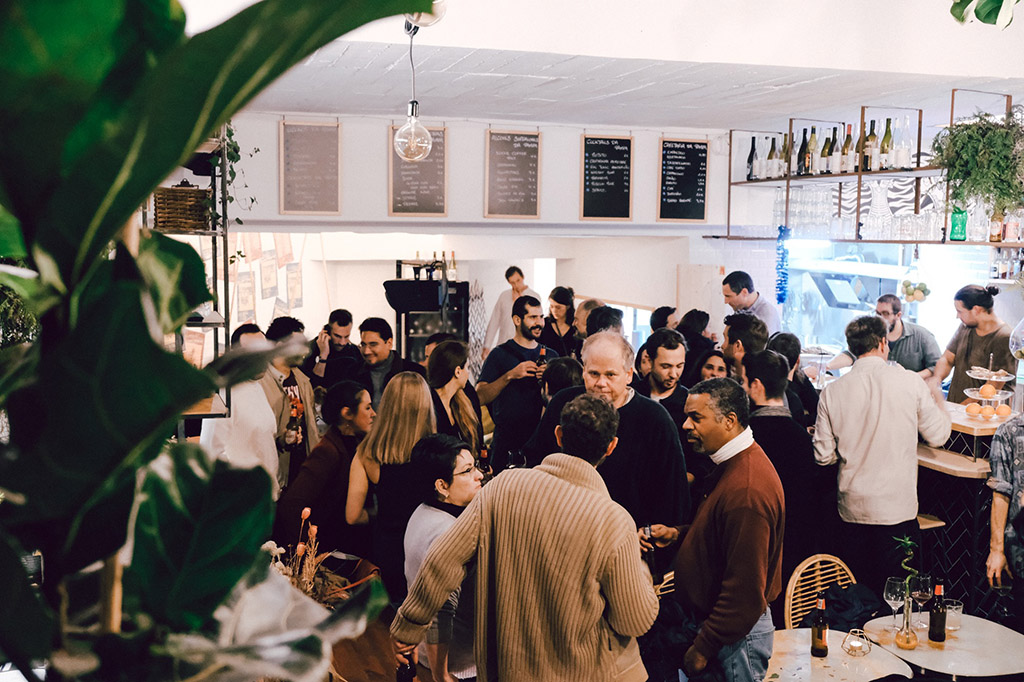
Start by checking the Lisbon Digital Nomads meetup page for upcoming events. Lisbon Digital Nomads is a community group run by a team of volunteer organizers.
There is a bar/restaurant meetup in a different location every Thursday, which is perfect for making some introductions. Other events include co-working, presentations, museum visits, running, hiking, etc.
For advice and recommendations, you can check out the Lisbon Nomads & Expats Facebook Group. For tips or to organize activities in town, you can also check out the Lisbon Digital Nomad Slack channel. The slack is run by the same independent team that organizes the nomad meetups throughout Lisbon.
Best co-working offices in Lisbon
Co-working offices have been appearing all over Lisbon — and at an accelerated rate since the pandemic.
Some co-work offices are focused on Portuguese freelancers and startups, others see many more internationals. Some are 90%+ hot-desking, others more membership-focused.
Because they’re all so different, it’s worth trying a few out to see if you like the vibe. You can do this most easily with Croissant.
Just to set your expectations: co-working offices in Lisbon won’t necessarily offer you an instant community. I’ve heard amazing tales of places such as Dojo on Bali that go for that kind of thing, but it’s rare in Lisbon.
Still, some co-works such as Outsite and Heden are known to organize after-work activities.
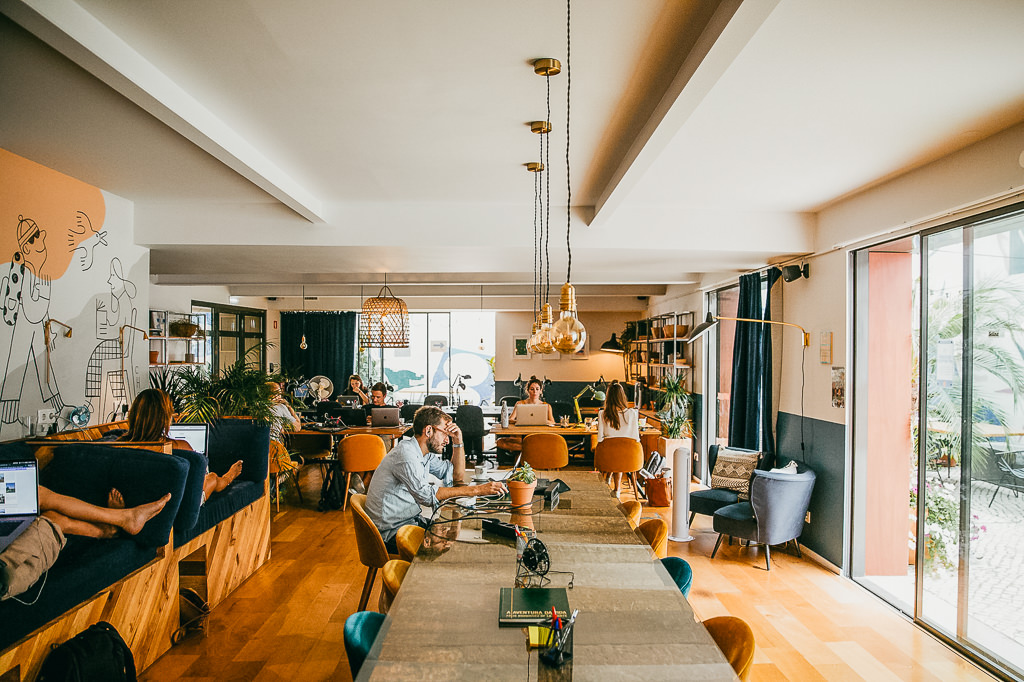
Selina Secret Garden Lisbon is a good workplace especially if you’re on a shorter stay. The office is nice, it’s often quite full, and it’s almost entirely international. You can pay to use the co-work without staying at the hotel.
Heden, Outsite, Unobvious Lab, and Resvés are some other nice co-working offices where you’re likely to meet other nomads.
Second Home Lisbon is a unique co-work worth mentioning for its incredible plant-filled interior. It definitely wants to be expensive and exclusive though; to me it seems mostly for jet-setters who read Wallpaper* and Monocle, if that’s your scene.
Best coffee shops to work from
If you prefer to work online from cafes then there are good options in Lisbon, though you have to look around for the best coffee shops in Lisbon to work from.
Most cafes in Lisbon are very traditional with metal seats, white-tiled walls, sports on TV, etc. They’re great places to get your 80-cent espressos, but not so laptop-friendly.
On the opposite end are the speciality coffee places, many of which I think are quite brunchy and not so ‘worky’.
Small cafes like Melbourne, Hello Kristof, or Heim get recommended often but they have very limited seating. Personally, I think the following cafes are better to work from:
Copenhagen Coffee Lab is always a good bet. This Lisbon chain has 8 cafes all over the city. Expensive (for Lisbon) coffee but great WiFi and nice brew.
Comoba. Often fairly crowded, but really nice open space with big windows.
DeBru. Brewpub by night, co-work by day. Dedicated desks with ergonomic chairs can be found upstairs, a cafe-like area downstairs. RSVP for your spot.
Coffee in Brew. Speciality coffee bar with window seats, large reading/working table, and upstairs loft area. Pet friendly. Not yet so well known so easy to find a spot here.

Bowls&Bar. Nice trendy spot, nice place to work a bit especially outside of the peak lunch hours.
Jeronymo in Campo de Ourique. This is a local Portuguese chain; no single origin coffee or anything Instagrammable here. I think it’s a great working spot as it has good WiFi and a bright indoor and outdoor space.
The Block Cafe. The number 1 hangout for the crypto crowd. Can pay in BTC. (Can later also feel sad about once having paid for a coffee in BTC.)
Aside from cafes with WiFi, you may find it highly worth getting a data SIM card so you can work from anywhere, especially the outdoors. Lisbon has tons of kiosks in squares, picnic tables in parks, and other public places.
Where to find rooms/apartments
For shorter stays (1-3 months) try Airbnb, asking for flatshares in nomad groups, or consider the co-living packages offered at Selina, Outsite, or Same Same. Flatio also has some medium-term rentals.
If you’re on a budget and on a shorter stay, then hostels may be a decent option too. Portugal is known for its high-quality hostels and some have on-site co-work offices.
For long-term rents, try SAPO, IMO Virtual, Bquarto, or the classifieds site OLX. It can be difficult given that a lot is in Portuguese, but Google Translate is always your friend. If you contact the agents or landlords, often they do speak (some) English.
Best areas to live in Lisbon
Chances are, you’ll want to live in the gorgeous historic center. This is clearly where most expats and digital nomads end up.
Many locals actually don’t like living in the center because they own cars, and it’s hard to park anywhere, and the buildings are old. Ask them and they’ll often recommend suburban areas like Lumiar or Benfica which are filled with modern apartment blocks.
Internationals on the other hand adore the central areas since they’re so charming, walkable, and buzzing with life. For many digital nomads, this is the reason to live in Lisbon.
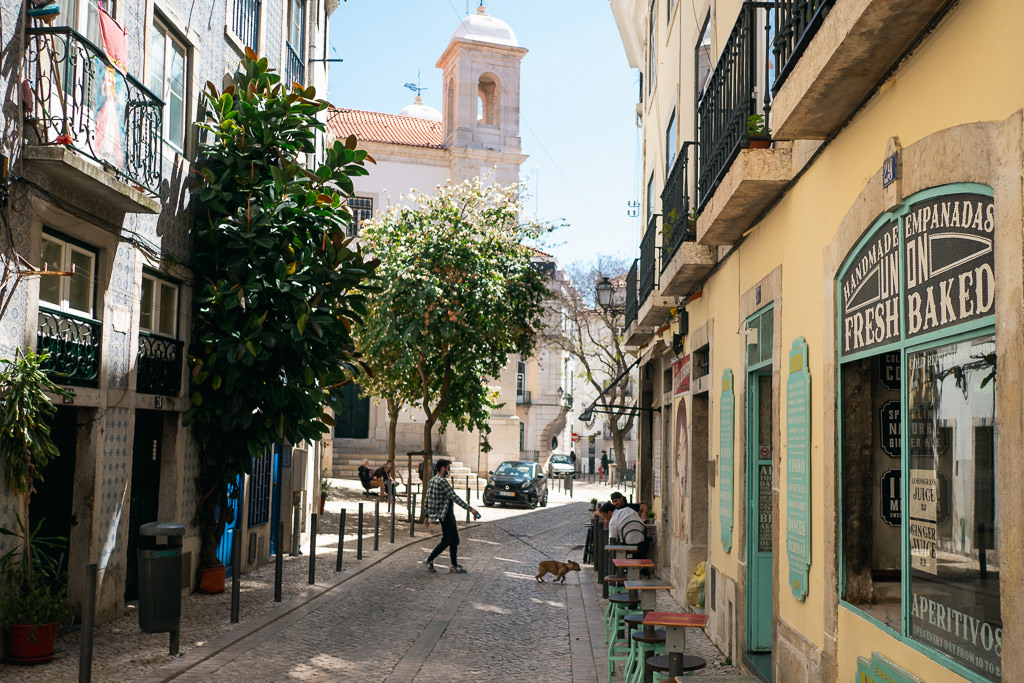
Here are some areas in the historical center worth looking at:
Lapa / Estrela — A great central area with loads of charm and green spaces. Very popular with internationals who want to be central but not in the tourist zone. I lived here for 3 years and loved it. The next-door area of Campo De Ourique is also a nice upper-middle-classy area with many trees and lots of organic/craft shops and such.
Principe Real — Adjacent area to Estrela. Great views of the city and also known as the gay district of Lisbon. Lots of boutique shops, cocktail bars, etc.
Arroios — TimeOut Magazine listed this as one of the 10 coolest neighborhoods in the world. That’s maybe pushing it a lot, though it’s a great multicultural area with lots of international food, bars with cool events, etc. (Anjos and Intendente are basically part of this area too.)
Chiado — A posh area that’s smack in the middle of the old center. Many upscale restaurants and such. Very central but one of the most expensive districts in Lisbon.
Santos — Narrow streets and many cute and beautifully tiled houses. I’m told French expats have been buying up houses here a lot. Get your croissants at La Boulangerie.
Graça — One of Lisbon’s oldest districts, situated on top of its tallest hill. Going up and down the hill is a bit of a chore (though there are some elevators) but the views are worth it.
Alcântara — Up-and-coming area under the iconic Lisbon bridge. Home to tourist/hipster area LXFactory, but also very authentic local areas. Can be a bit noisy (planes and bridge) but great vibe and getting popular with nomads/expats. I lived here for a year and it was great!
There are also areas like Alfama and Barrio Alto that may catch your eye. They are very touristy though and have kind of turned into Airbnb Land. Nice places to live for a month (especially outside the tourist high season) but less for long-term.
You might also consider living just outside Lisbon. For example, south of the river you can find towns near the beach — great if you surf!
Costa da Caparica is a resort town that has a lot to offer; it’s great if you prefer views of the ocean and lots of open space, but still want to visit Lisbon easily. As of 2021, there is the small but growing Digital Nomads Caparica group, which organizes local activities and operates on a paid membership basis.
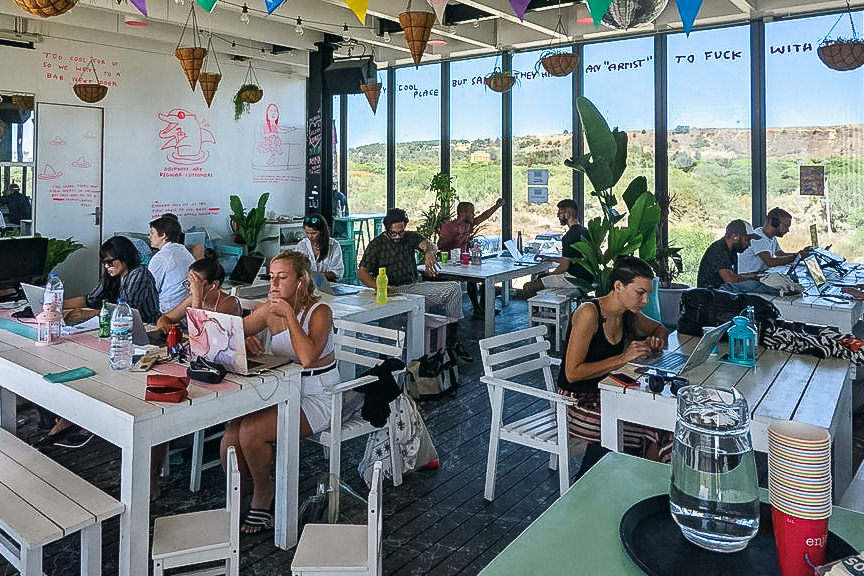
Cost of living in Lisbon
What should you expend to spend in Lisbon? Well, clearly we’re not in Bali or Chiang Mai. You do need a certain budget to live in Lisbon — and, to the chagrin of many locals, quite a lot if you’re locally employed.
Still, if you’re used to the prices in many other European capitals, then you’ll surely find Lisbon quite cheap.
Set lunch meals in local places can be had for 6 or 7 Euro. A regular (non-fancy) restaurant dinner might cost up to €15. An espresso at a Portuguese pastry shop or kiosk might cost you just 80 cents. Portuguese wine is cheap and good. Ubers/taxis are so inexpensive that you may end up using them constantly. Numbeo offers more examples of costs.
Rent comparatively costs a lot. You can count on spending around €900 per month, give or take, for a one-bedroom apartment. Compared to the local economy, this is very pricey. However, if you come from a high-income country, you may find that a really good deal.

As a side note: the housing situation in Lisbon is quite a hot-button issue — one you’ll probably end up hearing about. Locals have seen rent prices going up year after year, pushing them out of the city center. On the other hand, Lisbon’s recognition as a startup hub, tourism destination, etc., has contributed enormously to its rehabilitation and economic revival.
There is some hope the housing market will relax a bit. New Airbnb licenses are no longer issued in central Lisbon and the controversial ‘Golden Visa’ program (given to foreigners who buy real estate) will no longer apply in Lisbon starting in 2022. Still, the housing situation remains difficult. One thing you can do to help is to know the real prices and not overpay for your accommodation.
Weather in Lisbon
I happen to think Lisbon has a lovely climate year-round. The only things to know is that in winter it rains a lot and that it can be very cold inside the house if it doesn’t have central heating or good isolation, things that many of the older buildings in Lisbon lack.
Each season has its advantages, however. Winter is nice because there are fewer tourists, so you can have the city to yourself. Spring and autumn are great because of the mild sunny weather.
To know the average temperatures and more details on what each month of the year brings, see my overview of the best times to visit Lisbon.
Moving to Lisbon
Lisbon is a fantastic city to live for a while as a nomad. It may well inspire you to stay longer-term!
I’ve written before about moving to Lisbon and what it’s like living in Portugal, so check out those articles for some personal thoughts from a Lisbon resident.
If you want to stay in Lisbon for more than 3 months, you will need a residency permit. For EU citizens this is only a quick formality; after a visit to a local “citizen’s shop” you will get your permit instantly as per the EU freedom of movement laws.
If you’re non-EU, you’ll need to get a long-term visa in order to stay more than 90 days.
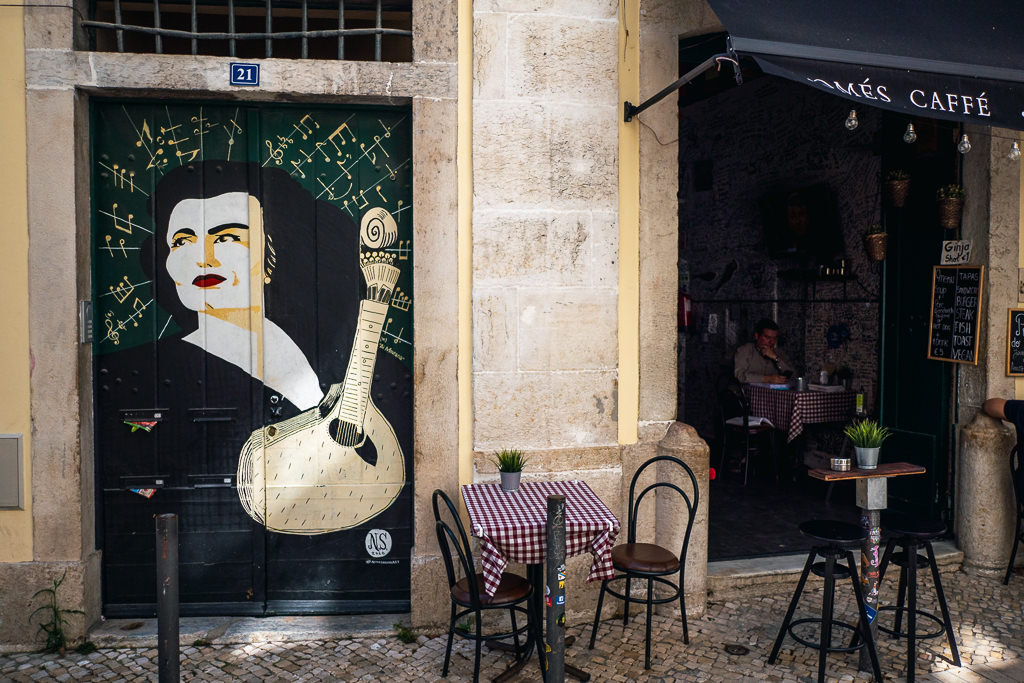
Tax advantages in Portugal
Portugal is a fairly high-tax country under normal circumstances. However, Portugal does offer some specific tax advantages that might apply to you if you decide to settle there for the first time.
The NHR program can give certain tax benefits for a period of 10 years. These are specific benefits and it’s worth speaking to an expert if they might be useful to you. One important thing to know is that you can only apply for NHR if you weren’t a tax resident in Portugal during the prior 5 years. So, it’s a good idea to check if it might be at all beneficial to you, as you only have one shot at applying for it.
Another advantage for some is that (personal) capital gains on cryptocurrency are as yet untaxed in Portugal. So, if you are a Portuguese tax resident and you earn money by selling your crypto holdings, you won’t be taxed and don’t have to report it.
Some links may be affiliate links, meaning I may earn commission from products or services I recommend. For more, see site policies.






0 comments
Leave a comment
Your email address will not be published. Comments are manually moderated.